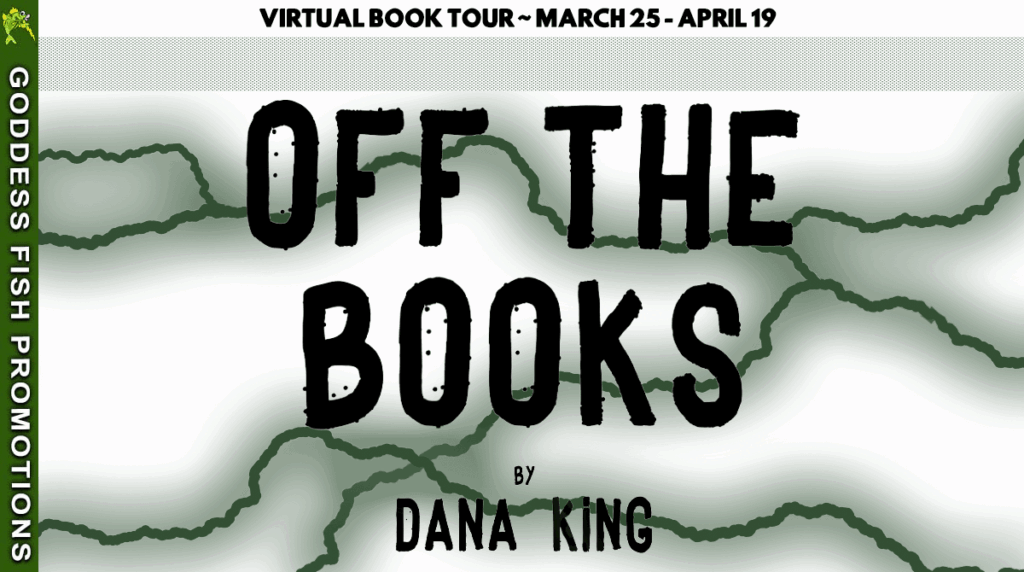This post is part of a virtual book tour organized by Goddess Fish Promotions. Dana King will award a $20 Amazon/BN GC to a randomly drawn winner. Click on the tour banner to see the other stops on the tour.
It’s kind of a running joke with writers that one form or another of “Where do ideas come from?” is their least favorite question. I saw the late Robert B. Parker tell this story many years ago:
Parker and Elmore Leonard both had books come out the same week. Both were booked onto the same early morning local talk show. In the Green Room before going on, one of them commented (I forget which) that he hoped he wasn’t asked where he gets his ideas; the other agreed.
They went on camera and the first thing the perky hostess did was ask Leonard where he gets his ideas.
“Utica,” he said, straight-faced. “There’s a little shop off the main drag. We all get our ideas there.
Unfazed – or inattentive, take your pick – the interviewer turned to Parker. “What about you, Mr. Parker?”
“Same place.”
It’s a funny story if only for the rap on morning TV hosts. I can also see why writers with the footprints of Leonard or Parker would tire of that question, as for most writers it’s the simplest thing in the world.
Well, I don’t have footprints anywhere near that big and I’m not tired of talking about it, as I have things to say some readers have found interesting in the past.
Think of the imagination as a muscle and, like any other muscle, the more it is exercised the more useful it becomes. Writers use their imaginations all day, every day, in a manner and at a level most readers never have to fuss with. So ideas eventually come easier to us.
But where do they come from? The truth is, anywhere. I have generated story ideas from these sources:
• Current events
• True crime stories
• Social media
• Court cases
• Fiction (TV/movies/books) where I think the story might have been better had it gone in a different direction. (Changing the names and circumstances. I’m endorsing creativity here, not plagiarism.)
• Fiction (TV/movies/books) that could serve as backstory for something I’d like to write. (Same plagiarism warning applies.)
• Song lyrics, especially country songs. (Case in point: I have a story in the upcoming edition of Dark Yonder magazine based on the song “Bartender Blues” sung by George Jones.)
• Discussions/arguments
• Walks
• Showers
• (Breaking news: As I was working on this post, it occurred to me the current “Shohei Ohtani’s translator has a serious gambling problem” story could have legs for me.)
The point is, ideas are everywhere; we’re practically tripping over them. I come up with a few good ones a week, and I am far from the most creative person I know. Coming up with the idea is the easy part. The hard work lies in making two decisions:
1. Is this something I want to dedicate a year of my life to? You don’t want to get six months down the road and realize you’re sick to death of this idea and have no stomach for finishing it. Don’t kid yourself. Authors fall out of love with ideas all the time.
2. Is this an idea that lends itself to my skill set? I write hard-boiled crime fiction, so I am not likely to do well with a time-travel romance, or even a mystery where a cat solves the crime. Nothing wrong with those kinds of stories; they’re just not in my wheelhouse. I discard quite a few ideas every year because, while I like the premise, as I noodle it out I realize someone else could write that story better.
I was at a conference several years ago and heard the following story. I’d tell you who the writers were but there had been some drinking done and who I thought it was said it wasn’t him, so I’m leaving names out altogether. The story holds up without them.
Anyway, two well-known authors who are good friends were having dinner. Author A gets to talking about an idea he has. Author B loves it, wishes he’d thought of it, good luck with the book.
A few months go by. They’re at dinner again and Author B asks how the book is coming. A says, “It’s not. The more I get into it, the more I realize it’s not for me.”
B asks if it’s okay if he gives it a shot. A gives his blessing, B rips through the book without difficulty, and it does well for him.
Here’s the thing: legally, B did not have to ask permission. You cannot copyright an idea, only what you do with it. For those of you old enough to remember the Twentieth Century, the classic TV show The Sopranos premiered January 10, 1999. On March 5, 55 days later, the movie Analyze This came out. Both are stories about mob bosses who see psychiatrist. I suppose the end results could be more different, but not much and still be based on the same idea.
Ideas are crucial; there can be no fiction without them. What’s more important is execution. What experienced writers have going for them that newbies do not is a better-developed ability to figure out quickly which of the multitude of ideas clamoring for attention they want to live with, and which suits them best. As with most things, experience is the best way to avoid a bad decision and, as we all know, experience most often comes from bad decisions.
I never said it was easy.
Nick Forte has lost his detective agency and makes ends meet doing background checks and other paperwork. He pays for everything else through jobs he takes for cash and without any written contract. What starts out as a simple investigation into a traffic accident exposes Forte to people who have truly lost everything and have no viable hope of reclaiming their lives. That doesn’t sit well with Forte, leading him and his friend Goose Satterwhite to take action that ends more violently than anyone expected.
“The return of Chicago private detective Nick Forte, the tough protagonist of two Shamus Award nominated novels, is well worth the wait. Nick’s latest escapade Off The Books—the first in nearly six years—will surely earn additional praise for the acclaimed series.”
-J.L .Abramo, Shamus Award-winning author of Chasing Charlie Chan.“Nick Forte reminds me of Robert B. Parker’s Spenser: a PI with a finely tuned sense of justice who doesn’t take anyone’s s***. Any fan of hardboiled detective fiction is in for a helluva ride.”
–Chris Rhatigan, former publisher of All Due Respect Books
Enjoy an Excerpt
I told Jason Worthington I’d find his daughter in a week. I surfed the internet and searched flophouses, cathouses, bar rooms, pool rooms, jails, hospitals, morgues, and SRO hotels. Found her in a pay-by-the-hour motel at 10:48 p.m. two days after her father and I spoke.
Worthington would have preferred me to find her alive.
Cindy’s body was warm, the spike still in her arm. She looked as if she’d fallen asleep waiting and didn’t hold my tardiness against me.
I did what any real-life professional investigator would do, and what no fictional private eye would even consider.
I called the police.
The cops kept me at the scene half the night, at the station until dawn. They asked the same questions both places and got the same answers.
“Why were you there?”
“Her father asked me to find her.”
“Why was the father looking for her?”
“My guess would be to keep what happened from happening. You’ll have to ask him yourself to be sure.”
The usual bullshit.
I called Worthington on my way out of the police station. Told him I had news but would prefer to deliver it in person. I didn’t suppose I needed to tell him anything after that, but it wouldn’t hurt to allow him time to prepare before I scarred the rest of his life.
He answered the door already dressed for work. Navy suit, white shirt with French cuffs, gold links. His tie was blue with small designs, maybe horses, gathered in a perfect four-square knot. Red suspenders. A suit coat hung from the newel post behind him. His forehead gleamed beneath a silvery hairline. His teeth were as white and straight as a Klan meeting.
About the Author: Off the Books is Dana King’s sixth Nick Forte private investigator novel. Two of the earlier books (A Small Sacrifice and The Man in the Window) received Shamus Award nominations from the Private Eye Writers of America. Dana also writes the Penns River series of police procedurals set in a small Western Pennsylvania town, as well as one standalone novel, Wild Bill, which is not a Western. His short fiction appears in numerous anthologies and web sites. He is a frequent panelist at conferences and reads at Noirs at Bars from New York to North Carolina.
Off the Books is Dana King’s sixth Nick Forte private investigator novel. Two of the earlier books (A Small Sacrifice and The Man in the Window) received Shamus Award nominations from the Private Eye Writers of America. Dana also writes the Penns River series of police procedurals set in a small Western Pennsylvania town, as well as one standalone novel, Wild Bill, which is not a Western. His short fiction appears in numerous anthologies and web sites. He is a frequent panelist at conferences and reads at Noirs at Bars from New York to North Carolina.
Buy the book at Amazon or read for free on Kindle Unlimited.
























Thanks for hosting!
Thanks for having me. I’ll be around all day, so if anyone has questions, please feel free to drop them in the comments.
Thank you for stopping by! Your post was fantastic, and we wish you all the best with your book.
This story sounds really interesting.
Thanks for having me. If anyone has questions, please drop them here. I promise to respond.
What do you consider to be your greatest strength as a writer?
Hi, Tracie. Thanks for stopping by.
There are two ways to answer that question. I could say it’s my discipline. When I’m working on a book, I write every day I can. Weekends, holidays, doesn’t matter. The only time i take time off when in the midst of a draft is when The Beloved Spouse and i take a road trip. Even then I try to lay things out so I’ll be at a good breaking point for the time I’ll be away.
That’s my greatest strength in getting the book written. From a reading persoective, I’d have to say it’s my dialog. I’ve heard too many times from people I respect that it’s the best aspect of my writing, so i lean on it.
The cover looks great. Sounds like a good story.
I appreciate such an insightful and in depth answer and wish you much happiness and success in 2024!